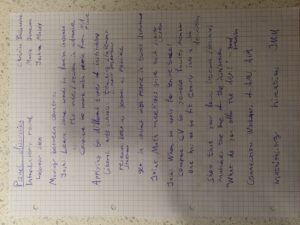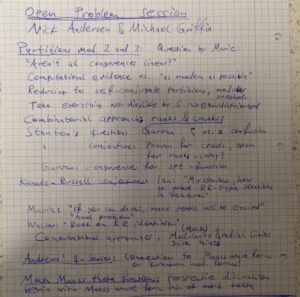Schedule, Abstracts, and Slides
All talks will take place in Stevenson Center 4309 (Building 4 of the Stevenson Center), at Vanderbilt.
Here is a hand-drawn diagram showing where the precise location of the building is: 1861_001
May 22:
- 8:15-8:45 Bagels, coffee, and registration
- 8:45-8:55 Opening remarks
- 9:00-9:50 Olivia Beckwith, University of Illinois at Urbana-Champaign (Plenary talk) (Slides: OliviaTalk)
- 10:00-10:50 Michael Griffin, BYU (Slides: GeneralPartitionDistribution)
- 11:00-11:50 Amanda Folsom, Amherst College
- 12:00-1:30 Lunch
- 1:30-2:20 Ayla Gafni, University of Mississippi (slides: Restricted_Partitions)
- 2:30-3:20 Ae Ja Yee, Penn State University (slides: mocktheta22_1)
- 3:30-4:20 Antun Milas, SUNY-Albany (slides: Vanderbilt_2022)
- 4:30-5:20 Panel discussion: Moderated by Crisitina Ballantine, Marie Jameson, and Joshua Males (notes on discussion by Andreas Mono:
 list of collaborative workshops by Cristina Ballantine: Collaborative Workshops)
list of collaborative workshops by Cristina Ballantine: Collaborative Workshops)
May 23:
- 8:30-9:00 Bagels and coffee
- 9:00-9:50 George Andrews, Penn State University (Plenary talk) (slides: Mock_Theta_My_Birthday_Talk)
- 9:50-10:30 Break and conference photo
- 10:30-11:20 Krishna Alladi, University of Florida
- 11:30-12:20 Nick Andersen, BYU
- 12:30-2:00 Lunch
- 2:00-2:50 Frank Garvan, University of Florida
- 3:00-3:30 Marie Jameson, University of Tennessee (slides: JamesonVanderbilt)
- 3:30-4:00: Lightning talks: Walter Bridges, Alejandro De Las Peñas Castaño, Benjamin Brindle, Nicholas Allen Smoot, Ian Wagner, Andreas Mono, and Paul Jenkins
- 4:00-4:50 Open problem session, Moderated by Nick Andersen and Michael Griffin (notes by Andreas Mono:
 , slides: open_problems3)
, slides: open_problems3)
Abstracts:
- SPEAKER: Krishnaswami Alladi
TALK TITLE: “Schmidt-type theorems viaweighted partition identities”ABSTRACT: A 1999 theorem of F. Schmidt statesthat the number of partitions into distinct partswhose odd indexed parts sum to n, equals thenumber of partitions of n. Recently using MacMahon’spartition analysis, Andrews and Paule establishedtwo further theorems of Schmidt-type. We will showthat Schmidt’s 1999 theorem is equivalent to aweighted partition identity involving Rogers-Ramanujanpartitions that I established in 1997. Using the weightedpartition approach, we provide new proofs of the twotheorems of Andrews-Paule. Finally, using weightedpartitions, we establish a new Schmidt type theoremwhich has links with two famous identities of L. J. Rogers,and with a series that Ramanujan communicated toHardy in his last letter of 1920.
- SPEAKER: Nick Andersen
TITLE: Mock theta functions and the Weil representationABSTRACT:In this talk I will give several examples of results that support the philosophy that mock theta functions prefer to be studied in families, for example the family containing Ramanujan’s third-order functions f(q) and omega(q). One convenient way to study a family of mock theta functions is to think of each function as a component of a vector valued harmonic Maass form that transforms according to the Weil representation.
-
PLENARY SPEAKER: George AndrewsTITLE: How Ramanujan May Have Thought of the Mock Theta FunctionsABSTRACT: The mock theta functions made their first appearance in Ramanujan’s last letter to Hardy. Ramanujan explains that he is trying to find functions apart from theta functions that behave like theta functions near the unit circle. Where did he ever get the idea that such functions might exist? Why in the world would he consider the special q-series that he lists in his last letter? The object of this talk is to provide a plausible explanation for the discovery of mock theta functions.
-
PLENARY SPEAKER: Olivia Beckwith
TITLE: Theta-type congruences for partitions and colored partitions
ABSTRACT : The arithmetic properties of the ordinary partition function p(n) have been a topic of intensive study ever since Ramanujan proved that for all integers n, p(Qn + t)≡0(mod Q) for the primes Q=5,7,11, where 24t = 1(mod Q). Today it is known that there are many congruences of the form p(Qmn+t)≡0(mod Q) for all n, where Q is prime and m≥5. In joint work with Scott Ahlgren and Martin Raum, we prove that such congruences where m is prime are scarce in a certain sense, if any exist at all, unless a certain nonzero cusp form has a large number of coefficients which are divisible by Q. On the other hand, ongoing joint work with Alex Caione, Jack Chen, Maddie Diluia, Oscar Gonzalez, and Jamie Su shows that there are infinitely many congruences of this type for the colored partition functions, and all of them appear to arise from a congruence modulo Q between a generating function for certain colored partition numbers and a theta function.
-
SPEAKER: Amanda Folsom
TITLE: Mock theta functions and quantum Jacobi forms
ABSTRACT : Quantum Jacobi forms (defined by Bringmann and the author) are a marriage of Zagier’s concept of a quantum modular form (defined in $\mathbb Q$) to Jacobi forms (defined on $\mathbb C \times \mathbb H$), developed by Eichler and Zagier. In this talk we will discuss roles played by (universal) mock theta functions within the subject of quantum Jacobi forms, and related results and applications. -
SPEAKER: Ayla Gafni
TITLE: Asymptotics of Restricted Partition Functions
ABSTRACT: Given a set $\mathcal A \subset \mathbb N$, the restricted partition function $p_{\mathcal{A}} (n)$ counts the number of integer partitions of $n$ with all parts in $\mathcal A$. In this talk, we will explore the features of the restricted partitions function $p_{\mathbb P_k}(n)$ where $\mathcal P_k$ is the set of $k$-th powers of primes. Powers of primes are both sparse and irregular, which makes $p_{\mathbb P_k}(n)$ quite an elusive function to understand. We will discuss some of the challenges involved in studying restricted partition functions and what is known in the case of primes, $k$-th powers, and $k$-th powers of primes. -
SPEAKER: Frank Garvan
TITLE: New symmetries for Dyson’s rank function and Zagier’s higher order mock theta functions
ABSTRACT:Many of Ramanujan’s mock theta functions are connected to the Dyson rank function. We give new symmetries for the p-dissection. Parts of the p-dissection relate to Zagier’s higher order mock theta functions through holomorphic projection. This leads to generalizations of Hickerson’s mock theta conjectures to primes greater than 7. -
SPEAKER: Michael Griffin
TITLE: Distributions on integer partitions
-
SPEAKER: Marie Jameson
TITLE: Wronskians of graded dimensions
ABSTRACT: In the study of vertex operator algebras, one finds that the graded dimensions of irreducible modules are q-series that can often be understood as modular forms. Here we follow work of Milas and others to study the Wronskians of these and related q-series.
-
SPEAKER: Antun MilasTITLE: Characters, Schemes, and q-series
ABSTRACT: Vertex operator constructions of affine Lie algebras (pioneered by Lepowsky and Wilson in the early 1980s) have been used to prove or conjecture many nontrivial combinatorial and q-series identities.In the recent years we have witnessed new remarkable correspondences between vertex algebras and certain 4-dimensional N=2 quantum field theories. This correspondence predicts that the superconformal index (more precisely its limit), on the 4d side, computes the character of a vertex algebra (q-series). Moreover, the correspondence sometimes predicts different representations for characters based on the geometry of associated schemes of vertex algebras.In this overview talk, I’ll discuss how ideas from algebraic geometry and physics provide new insights into some known and new q-series (identities), including their modular properties.This talk will be fairly accessible, assuming minimal background. No familiarity with concepts like vertex algebras or 4d QFT is needed. -
SPEAKER: Ae Ja YeeTITLE:Partitions associated with the Ramanujan/Watson mock theta functions $\omega(q)$ and $\nu(q)$
ABSTRACT:Partition-theoretic interpretations of various results involving mock theta functions have been the subject of intense study for many decades. For instance, there are the well-known “Mock Theta Conjectures”. On the other hand, a mock theta function itself may also admit a simple and interesting combinatorial interpretation. For instance, some of Ramnujan’s mock theta functions serve as the generating functions for certain types of partitions. In this talk, I will discuss the new interpretation of the mock theta functions $\omega(q)$ and $\nu(q)$ given by Andrews, Dixit and myself in 2015 focusing on how this interpretation has led to new discoveries.
Panel discussion: The conference will run a panel discussion focused on issues affecting early career researchers. Topics will include subjects such as how to apply for postdoctoral and tenure track positions, issues affecting women and minorities, and how to secure high-quality letters of recommendation. This is tentatively will be moderated by Cristina Ballantine, Marie Jameson, and Joshua Males.
Open problem session: The conference will host a session to discuss both well-established and new exciting open problems regarding combinatorics and modular forms. This will be moderated by Nick Andersen and Michael Griffin.